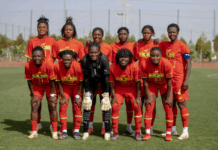Can you imagine a structure allocated for a library facility now serves as a store room and a place for eating?
That is the reality at Achinakrom Municipal Assembly Primary school in the Ejisu-Juaben Municipality of Ashanti Region.
Upon entry, a bowl with used polythene bags can be spotted sitting on a table close to the window, suggesting that someone had just finished eating.
The room that was built to hold books for reading now have dry-lines hanging loosely across, napkins hanging on the lines.
Old drums, pots, buckets and a big drum filled with water have also taken over the place.
At the left corner of the room, after the door, lie some old slabs of wood, shovels and water hose, then some aluminium roofing sheets and PVC pipes at the right corner.
The few books left on the two shelves available are torn, some tattered and look dirty.
Good quality education, according to the Sustainable Development Goals, must hinge on literacy and numeracy.
It demands that by 2030, all youth and a substantial proportion of adults, both men and women must achieve literacy and numeracy.
Unfortunately, the situation is the opposite in many rural schools in the country.
Many children either read badly or cannot read at all because schools lack basic infrastructure and materials for effective teaching and learning.
To address the challenge, facilities like libraries are critical.
At Achinakrom M/A Primary School, however, what is supposed to be the library has become a kitchen and eating place.
The headmaster of the school, Francis Samuel Kattah explains the space can serve a double purpose of a library, reading room and ICT centre but for lack of furniture.

“We have rather turned it into a store room and a dining area for staff. It makes me feel very bad because the facility is there, some people don’t have the facility but we have it and it is not functioning,” the headmaster said.
For a very long time, the school stock of books has not been replenished.
Mr. Kattah reveals, “it is very recently that USAID gave us 206 books but even with that we cannot use the library”.
Sometimes, three students have to share a book during reading hours which take place in the classroom.
Class Three teacher, Christopher Agyei Antwi, is disturbed about the situation, noting that it impacts negatively on teaching and learning.
“It affects them because when they come to school they don’t get books to read,” he said.
The school also struggles with Information and Communication Technology (ICT) education as almost all 300 pupils share two computers.
One of the computers was provided by the Parent, Teacher Association (PTA) for administrative purposes.
When it is time for ICT lessons, the two computers are taken to the classrooms for demonstration.
This means only one class can hold computer classes at a time.
“Facilities to make it very effective are not there. We are capable teachers ready to teach ICT but the motivation is not there. If we receive help, ICT will be promoted well”, worried Mr. Kattah explains.
So while some cry for a structure for a library, others have it but they are using it for something else.
Infrastructure deficit in basic schools remains a challenge that calls for attention from government and stakeholders.






